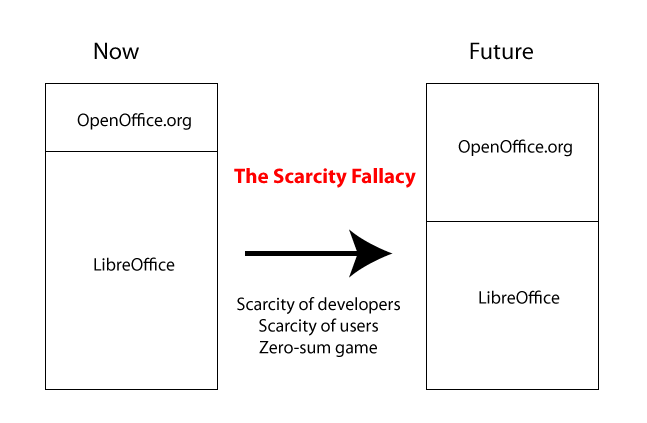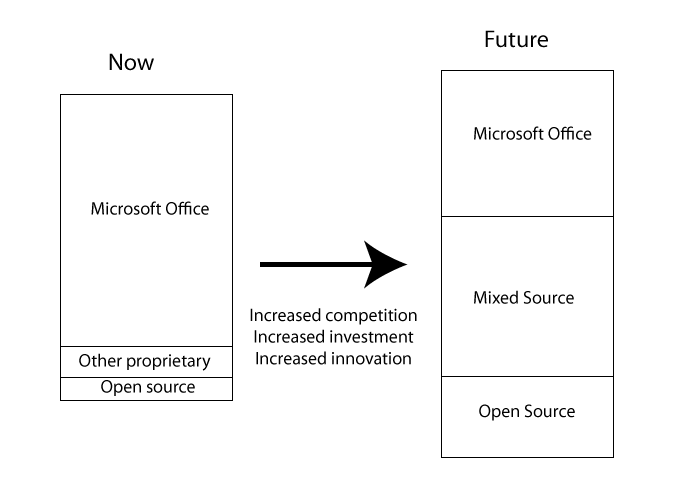As you’ve probably heard, the proposal to move OpenOffice.org to the Apache Software Foundation was approved by a wide margin. Volunteers interested in helping with this project continued to sign up, even during the 72-hour ballot, giving the project 87 members, as well as 8 experienced Apache mentors, at the end of the vote. The volunteers signed up included an impressive number of programmers from OpenOffice.org, RedOffice and Symphony, as well as QA engineers, translators, education project experts, OOo user forum moderators and admins, marketing project members, documentation leads, etc. The broad range of support for this new project, from volunteers as well as voters, was very encouraging.
Of course, this is not the end of our recruitment effort. In some sense it marks only the beginning. What I wrote about in my previous notes, about the Apache meritocracy remains true. However, now that the proposal has advanced and an Apache “Podling” (a probationary project) has been created, the way to sign up has changed. You should now sign up to the project’s mailing lists directly. For example, an email to ooo-dev-subscribe@incubator.apache.org will get you onto the project’s main dev mailing list. Anyone interested in participating needs to get onto this list, including those who already earlier expressed interest as “proposed committers” as well as new volunteers.
I would be negligent if, in mentioning the successful approval of the Apache OpenOffice proposal, I did not acknowledge that there were other, dissenting, opinions expressed. That is fine and indeed welcome. It is good that we don’t all think the same. However, in order to have a plurality of views, and to give users a plurality of applications to choose from, we also need plurality of projects in the open source world. So it was disappointing to witness a small but vocal minority of non-Apache members who disagreed with the proposal and who attempted to derail it. The day closed minded open source advocates decide to smother a new project in its crib, because they personally favor a different project, is the day that FOSS dies.
I believe that one unstated assumption in their reasoning was that there is a scarcity of developers and a scarcity of users in the personal productivity application area, and that the success of a new project can only come at the expense of another project, in this case at the expense of LibreOffice. The assumption was that we’re playing a zero-sum game, and like junk yard dogs we’re fighting to the death over scraps. In this view (which I believe to be false), as illustrated below, LibreOffice supporters see Apache OpenOffice as a mortal threat to their project, since its gain comes only at their expense.

Of course, this is inaccurate in many ways. For example, the market share of LibreOffice, although strong on Linux, is actually quite low in the much larger Windows platform, where OpenOffice is still the leading open source office suite. So overall, OpenOffice has greater market share than LibreOffice has today.
And in the real world, outside of FOSS blogs, the world runs predominately Microsoft Office, a proprietary set of applications. The other proprietary applications, like Corel WordPerfect and Google Docs and Apple iWork, combined with Microsoft Office represent well over 90% of the market. Open source, of all varieties, including LibreOffice, is rather small.
So rather than fighting over the remaining 5%, I think we should set our sights on a more transformative engagement with the market. This need not be a zero-sum, I-Win/You-Lose situation. OpenOffice and LibreOffice can both win. OpenOffice and LibreOffice and Calligra Suite and AbiWord and Gnumeric can all gain users at the same time. And this can happen at the same time that mixed-source applications based upon OpenOffice also grow and gain users.
There is no scarcity but scarcity in vision.
Apache OpenOffice, with its permissive license, is an excellent basis now for open source as well as mixed source business models, business models that drive investment back into the ecosystem. The mixed source segment will grow the most, I believe. But so will the pure open source version, because of the increased investment. We’ve had LGPL with OpenOffice for 10 years now. We’ve seen the modest success with which business models based on LGPL advanced in this segment of the market. Do we think another 10 years of the same will do much better? Personally, I think it is time, after a decade, to try enabling additional options, things that have not been tried yet.
So rather than the scarcity fallacy, the impact of Apache OpenOffice will be more like the following diagram:

So let’s stop this nonsense, this fallacy of scarcity. Let’s stop fighting over that little 5% box. Instead, let’s look toward how we restore the choice and diversity that we had in this market segment back in 1990, but do it better. We have something now we didn’t have back then, and that is an International Standard for document exchange, ODF. This can and should be the basis for interoperability among competing application suites.
